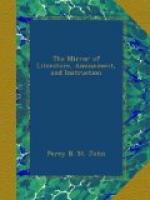“Out cam the gudeman, and high he
shouted;
Out cam the gudewife, and low she louted;
And a’ the town neighbours were
gathered about it:
And
there was he, I trow.”
The merriment of the company, however, soon gave way to considerations of humanity. Ludicrous as was the minister, with such an object where his head should have been, and with the feet of the pot pointing upwards, like the horns of the great Enemy, it was, nevertheless, necessary that he should be speedily restored to his ordinary condition, if it were for no other reason than that he might continue to live. He was accordingly, at his own request led into the smithy, multitudes flocking around to tender him their kindest offices, or to witness the process of release; and, having laid down his head upon the anvil, the smith lost no time in seizing and poising his goodly forehammer. “Will I come sair on, minister?” exclaimed the considerate man of iron, in at the brink of the pot. “As sair as ye like,” was the minister’s answer; “better a chap i’ the chafts than die for want of breath.” Thus permitted, the man let fall a blow, which fortunately broke the pot in pieces, without hurting the head which it enclosed, as the cook-maid breaks the shell of the lobster, without bruising the delicate food within. A few minutes of the clear air, and a glass from the gudewife’s bottle, restored the unfortunate man of prayer; but, assuredly, the incident is one which will long live in the memory of the parishioners of C——.—Chambers’ Edinburgh Journal.
* * * * *
THE NATURALIST.
* * * * *
LOUDON’S MAGAZINE OF NATURAL HISTORY.
Sundry and manifold are our obligations to this delightful Journal. From the Number (26) for the present month we glean the following:
The Gurnard and Sprat.
Mr. J. Couch, in an interesting paper on the fishes of Cornwall, has the following notes:
“Ray observes that the word gurnard, which may be regarded as the English term, is derived a grunnitu, from grunting like a hog. In this, however, I venture to think this eminent naturalist mistaken. Pengurn is the ancient Cornu-British name for these fishes, and signifies hard head; and its English translation is now sometimes given to the grey gurnard. From the Cornish word gurn (hard), I therefore derive




